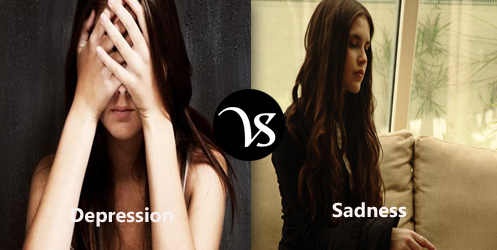 Depression:
Depression:
Depression is a state of low mood and aversion to activity that can affect a person’s thoughts, behavior, feeling and sense of well-being. Depressed people may feel hopeless, sad, anxious, empty, helpless, worthless, guilty, irritable and worthless. They may lose interest in activities. It can lead to emotional and physical problems. It may take the life of the people. With true depression you have low mood and other symptoms each day for at least two weeks. About 5 in 100 adults have depression every year.
Sadness:
Sadness is the emotional pain associated with the feelings of disadvantage, loss, despair, helplessness and sorrow. The person experiencing sadness may become quiet or lethargic and stay away from others. Crying is the indication of sadness. People deal with sadness in various ways. It is an important emotion because it helps to motivate people to deal with their situation. Sadness is not constant. Sadness may usher in negative thoughts. Sadness is painful and it sucks. Sadness can occur at very regular intervals in our everyday lives.
Differences:
| Basis | Depression | Sadness |
|---|---|---|
| Definition (www.oxforddictionaries.com) | Feelings of severe despondency and dejection | The condition or quality of being sad |
| Synonyms | Despair, hollow, anguish, impression, woe, sorrow, dejection | Dejection, gloom, despair, unhappiness, sorrow, desolation |
| Antonyms | Elevation, cheeriness, recovery, convexity, bulge, happiness | Elation, mirth, fun, delight, cheerfulness, gladness |
| Word origin | The word depression was originated from Late Middle English: from Latin depressio(n-), from deprimere ‘press down’. | The word sadness was originated from before 1000; Middle English; Old English sæd grave, heavy, weary, orig. sated, full; cognate with German satt, Gothic saths full, satisfied; akin to Latin satis enough, satur sated, Greek hádēn enough. |
| Results | It compels a person for suicidal ideation. | Sadness may reduce the ability to enjoy the life. |
| Normality | The people do not remain normal. | The people remain normal. |
| Illness | It is a real illness. | It is not an illness. |
| Duration | It remains constant. | It is temporary. |
| Requirement | It requires assistance, medication and support. | It does not require medication assistance. |
| Pronunciation |
|
|
| Example in Sentence |
|
|





